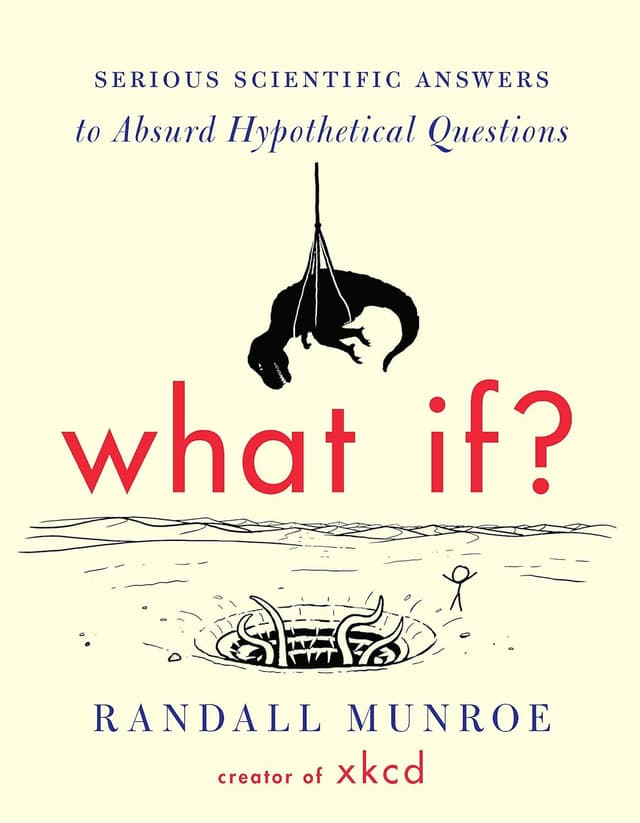Noah Brier | January 27, 2020
Why is this interesting? - The Data Edition
On numbers, context, and clarity
Recommended Products

A book by Randall Munroe that explores absurd hypothetical questions with serious scientific answers.
Noah here. One of the things that comes up a lot when writing WITI is how much context to give when writing about different topics. As I wrote in the Correction Edition, a lot of the work is figuring out what is worthy of explanation, what can get away with just a link, and what doesn’t need to be contextualized at all. This is particularly true of data. While I make no claims of being an expert in how to best present numbers, many of the emails we write include some mention of costs (oil in the Oman Edition), frequency (accidents per million departures in the Turbulence Edition), or size (number of horses in Garzon in the Mallmann Edition) to help tell the story.
Why is this interesting?
I was intrigued to read a few different bits of advice on how to best think about contextualizing data. The first comes from Randall Munroe, creator of XKCD and author of the very-fun What If?: Serious Scientific Answers to Absurd Hypothetical Questions. Much of what Munroe does in the book is pull apart seemingly absurd questions and find ways to visualize the data and process behind trying to answer them. A good example of his approach can be seen in this comic comparing the relative security of various password requirements (one of my all-time favorites):

In an interview he did with FiveThirtyEight when What If? came out, Munroe explained his approach to estimating:
One thing that bothers me is large numbers presented without context. We’re always seeing things like, “This canal project will require 1.15 million tons of concrete.” It’s presented as if it should mean something to us, as if numbers are inherently informative. So we feel like if we don’t understand it, it’s our fault. …
It can be more useful to look for context. Is concrete a surprisingly large share of the project’s budget? Is the project going to consume more concrete than the rest of the state combined? Will this project use up a large share of the world’s concrete? Or is this just easy, space-filling trivia? A good rule of thumb might be, “If I added a zero to this number, would the sentence containing it mean something different to me?” If the answer is “no,” maybe the number has no business being in the sentence in the first place.
He goes on to describe how he has memorized a bunch of random numbers to make for easier comparisons. “I remember that Wyoming is the smallest state and has a bit over half a million people,” he says, “and that New York’s metro area has about 20 million.” All quite helpful.
Taking things one step further, I recently stumbled on another bit of advice from Columbia statistics professor Andrew Gelman via his excellent (and more exciting than it sounds) blog Statistical Modeling, Causal Inference, and Social Science. After speaking to a group of science journalists about statistical paradoxes he was asked a question about how to do better with stats as a writer. The crux of his answer was:
I recommended to the reporter that, when he sees a report of an interesting study, that he contact the authors and push them with hard questions: not just “Can you elaborate on the importance of this result?” but also “How might this result be criticized?”, “What’s the shakiest thing you’re claiming?”, “Who are the people who won’t be convinced by this paper?”, etc. Ask these questions in a polite way, not in any attempt to shoot the study down—your job, after all, is to promote this sort of work—but rather in the spirit of fuller understanding of the study.
I probably should have presented these in the opposite order: Step one is to ask the right questions to understand the data, and step two is to contextualize it properly so that it’s meaningful. A good approach in writing and life. (NRB)
Bird of the Day:
A curl-crested aracari. Saw this on Twitter at some point and it was too good not to file away. Check out those stylish locks. (NRB)

Quick Links:
The FT’s David Gardiner on the current state of Lebanon (CJN)
New app from the founder of Vine to take on the Tiktok Death Star (CJN)
Sleepwalking into a surveillance state (CJN)
Thanks for reading,
Noah (NRB) & Colin (CJN)
Why is this interesting? is a daily email from Noah Brier & Colin Nagy (and friends!) about interesting things. If you’ve enjoyed this edition, please consider forwarding it to a friend. If you’re reading it for the first time, consider subscribing (it’s free!).